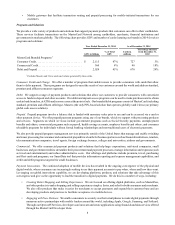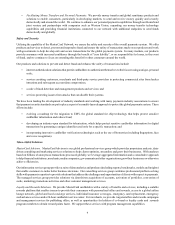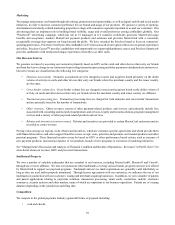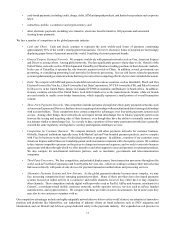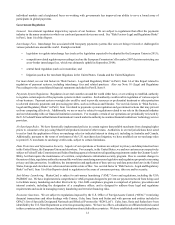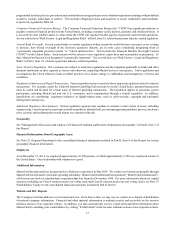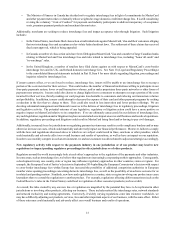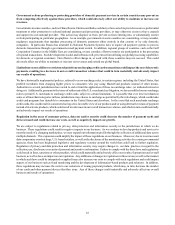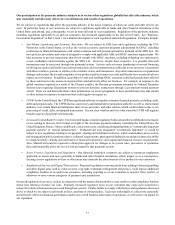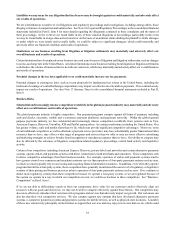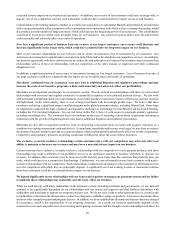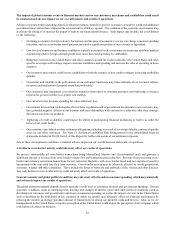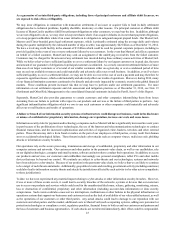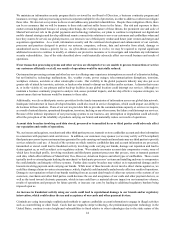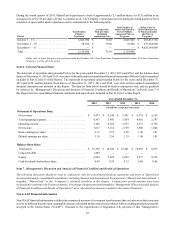MasterCard 2014 Annual Report Download - page 20
Download and view the complete annual report
Please find page 20 of the 2014 MasterCard annual report below. You can navigate through the pages in the report by either clicking on the pages listed below, or by using the keyword search tool below to find specific information within the annual report.18
Liabilities we may incur for any litigation that has been or may be brought against us could materially and adversely affect
our results of operations.
We are a defendant on a number of civil litigations and regulatory proceedings and investigations, including among others, those
alleging violations of competition and antitrust law. See Note 18 (Legal and Regulatory Proceedings) to the consolidated financial
statements included in Part II, Item 8 for more details regarding the allegations contained in these complaints and the status of
these proceedings. In the event we are found liable in any of these material litigations or proceedings, particularly in the event
we may be found liable in a large class-action lawsuit or on the basis of an antitrust claim entitling the plaintiff to treble damages
or under which we were jointly and severally liable, we could be subject to significant damages, which could materially and
adversely affect our financial condition and results of operations.
Limitations on our business resulting from litigation or litigation settlements may materially and adversely affect our
overall business and results of operations.
Certain limitations have been placed on our business in recent years because of litigation and litigation settlements, such as changes
to our no-surcharge rule in the United States. Any future limitations on our business resulting from litigation or litigation settlements
could reduce the volume of business that we do with our customers, which may materially and adversely affect our overall business
and results of operations.
Potential changes in the tax laws applicable to us could materially increase our tax payments.
Potential changes in existing tax laws, such as recent proposals for fundamental tax reform in the United States, including the
treatment of earnings of controlled foreign corporations, may impact our effective tax rate and tax payments. This could adversely
impact our results of operations. See also Note 17 (Income Taxes) to the consolidated financial statements included in Part II,
Item 8.
Business Risks
Substantial and increasingly intense competition worldwide in the global payments industry may materially and adversely
affect our overall business and results of operations.
The global payments industry is highly competitive. Our payment programs compete against all forms of payment, including
cash and checks; electronic, mobile and e-commerce payment platforms; and payments networks. Within the global general
purpose payments industry, we face substantial and increasingly intense competition worldwide from systems such as Visa,
American Express, Discover, UnionPay, JCB and PayPal among others. In certain jurisdictions, including the United States, Visa
has greater volume, scale and market share than we do, which may provide significant competitive advantages. Moreover, some
of our traditional competitors, as well as alternative payment service providers, may have substantially greater financial and other
resources than we have, may offer a wider range of programs and services than we offer or may use more effective advertising
and marketing strategies to achieve broader brand recognition or merchant acceptance than we have. Our ability to compete may
also be affected by the outcomes of litigation, competition-related regulatory proceedings, central bank activity and legislative
activity.
Certain of our competitors, including American Express, Discover, private-label card networks and certain alternative payments
systems, operate end-to-end payments systems with direct connections to both merchants and consumers. These competitors seek
to derive competitive advantages from their business models. For example, operators of end-to-end payments systems tend to
have greater control over consumer and merchant customer service than operators of four-party payments systems such as ours,
in which we must typically rely on our issuing and acquiring financial institution customers. In addition, even when they operate
programs that utilize a four-party system, these competitors have generally not attracted the same level of regulatory or legislative
scrutiny of their pricing and business practices as have operators of four-party payments systems such as ours. If we continue to
attract more regulatory scrutiny than these competitors because we operate a four-party system, or we are regulated because of
the system we operate in a way in which our competitors are not, we could lose business to these competitors. See “Business-
Competition” in Part I, Item 1.
If we are not able to differentiate ourselves from our competitors, drive value for our customers and/or effectively align our
resources with our goals and objectives, we may not be able to compete effectively against these threats. Our competitors may
also more effectively introduce their own innovative programs and services that adversely impact our growth. Our customers can
also develop their own competitive services. We also compete against new entrants that have developed alternative payments
systems, e-commerce payments systems and payments systems for mobile devices, as well as physical store locations. A number
of these new entrants rely principally on the Internet to support their services and may enjoy lower costs than we do, which could


